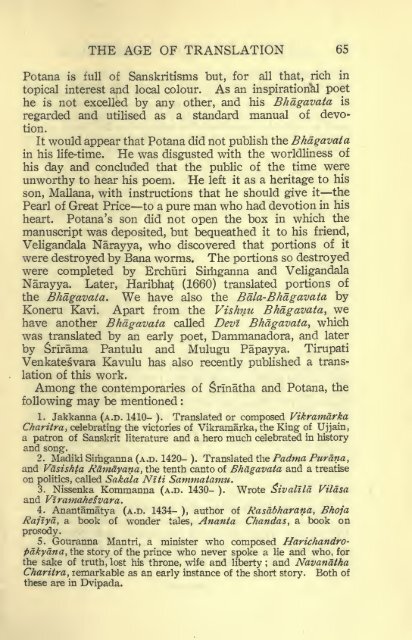A history of Telugu literature; - Cristo Raul
A history of Telugu literature; - Cristo Raul
A history of Telugu literature; - Cristo Raul
You also want an ePaper? Increase the reach of your titles
YUMPU automatically turns print PDFs into web optimized ePapers that Google loves.
THE AGE OF TRANSLATION 65<br />
Potana is full <strong>of</strong> Sanskritisms but, for all that, rich in<br />
topical interest and local colour. As an inspirational poet<br />
he is not excelled by any other, and his Bhdgavata is<br />
regarded and utilised as a standard<br />
tion.<br />
manual <strong>of</strong> devo-<br />
It would appear that Potana did not publish the Bhdgavata<br />
in his life-time. He was disgusted with the worldliness <strong>of</strong><br />
his day and concluded that the public <strong>of</strong> the time were<br />
unworthy to hear his poem. He left it as a heritage to his<br />
son, Mallana, with instructions that he should give it the<br />
Pearl <strong>of</strong> Great Price to a pure man who had devotion in his<br />
heart. Potana's son did not open the box in which the<br />
manuscript was deposited, but bequeathed<br />
Veligandala Narayya, who discovered that portions<br />
it to his friend,<br />
<strong>of</strong> it<br />
were destroyed by Bana worms. The portions so destroyed<br />
were completed by Erchuri Sirhganna and Veligandala<br />
Narayya. Later, Haribhat (1660) translated portions <strong>of</strong><br />
the Bhdgavata. We have also the Bdla-Bhdgavata by<br />
Koneru Kavi. Apart from the Vishnu Bhdgavata, we<br />
have another Bhdgavata called Devi Bhdgavata, which<br />
was translated by an early poet, Dammanadora, and later<br />
by Srirama Pantulu and Mulugu Papayya. Tirupati<br />
Venkatesvara Kavulu has also recently published a translation<br />
<strong>of</strong> this work.<br />
Among the contemporaries <strong>of</strong> Srinatha and Potana, the<br />
following may be mentioned :<br />
1. Jakkanna (A.D. 1410- ). Translated or composed Vikramarka<br />
Charitra, celebrating the victories <strong>of</strong> Vikramarka, the King <strong>of</strong> Ujjain,<br />
a patron <strong>of</strong> Sanskrit <strong>literature</strong> and a hero much celebrated in <strong>history</strong><br />
and song.<br />
2. Madiki Sirhganna (A.D. 1420- ). Translated the Padma Pttrana,<br />
and Vasishta Ramdyana, the tenth canto <strong>of</strong> Bhagavata and a treatise<br />
on politics, called Sakdla Nlti Sammatamu.<br />
3. Nissenka Kommanna (A.D. 1430- ). Wrote Sivallla Vilasa<br />
and Viramahesvara.<br />
4. Anantamatya (A.D. 1434- ), author <strong>of</strong> Rasabharana, Bhoja<br />
Rajlya, a book <strong>of</strong> wonder tales, Ananta Chandas, a book on<br />
prosody.<br />
5. Gouranna Mantri, a minister who composed Harichandropakyana,<br />
the story <strong>of</strong> the prince who never spoke a lie and who, for<br />
the sake <strong>of</strong> truth, lost his throne, wife and liberty ; and Navanatha<br />
Charitra, remarkable as an early instance <strong>of</strong> the short story. Both <strong>of</strong><br />
these are in Dvipada.

















